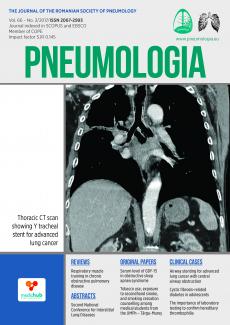General review
Sleep apnea syndrome - cause of resistance to treatment of arterial hypertension
Stefan Frent1, Voicu Tudorache1, Carmen Ardelean2, Diana Dimitriu2, Daniel Lighezan3, Dan Gaita4, Stefan Mihaicuta1Sleep apnea syndrome - cause of resistance to treatment of arterial hypertension
ABSTRACT
The prevalence of sleep apnea syndrome is relatively high in population (5%). The mortality is significantly higher in those with apnea-hypopnea index >20. There is an increased rate of car accidents in the subjects with OSA compared to those who don't have this syndrome (31% vs. 6%). The impact of OSA on mortality is also given by its association with a significant number of cardiovascular diseases. The association between OSA and hypertension has been much debated. The prevalence of hypertension among patients with OSA varies between 50-58%, while the prevalence of OSA in hypertensive patients is 30%. A particular association is OSA and resistant hypertension, i.e. blood pressure that remains above goal in spite of the concurrent use of three antihypertensive agents of different classes, one to be a diuretic and all pharmacological agents being prescribed at recommended doses. Secondary causes of hypertension are common in patients with resistant hypertension. Among these causes, one of the most frequent is sleep apnea syndrome. Some of the mechanisms by which sleep apnea contributes to the development of hypertension are intermittent hypoxia and/or increased upper airway resistance associated with sleep apnea that induces a sustained increase in sympathetic nervous system activity. Treatment of sleep apnea with continuous positive airway pressure devices (CPAP) improves blood pressure control, although the benefit of CPAP evaluated in clinical trials is variable.
Keywords: sleep apnea syndrome, mortality, association, resistant hypertension, CPAP




 Sleep apnea syndrome - cause of resistance to treatment of arterial hypertension
Sleep apnea syndrome - cause of resistance to treatment of arterial hypertension 